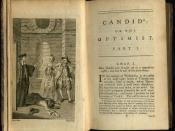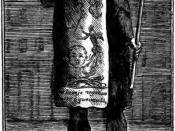CANDIDE--OPTIMISM
Voltaire's Candide is a satire on optimism. The time when Candide was written, the intellectual movement known as the Enlightenment was spreading ideas about the equality and basic rights of man and the importance of reason and scientific objectivity. Through Candide, Voltaire expressed the misleading notion of Gottfried William von Leibniz's theory of optimism. Liebniz developed the idea that the world they were living in at that time was "the best of all possible worlds." Throughout the novel, Voltaire ridicules and criticizes the belief that God necessarily made our world the best of all possible ones, and that all is well. These criticisms are clearly expressed through blind optimism, ineffective philosophical theories, and the degenerating potential of wealth.
Evidence of nonsensical optimism is present through the misadventures of many characters. At the beginning of the novel, Pangloss, a philosopher, teaches his student, Candide that "All is well".
The two come to believe that since God must be perfect, the world he created must also be perfect. Both prove this theory to be false. Pangloss acquires syphilis and he tries to explain to Candide that it is for the better--"It was an indispensable part of the best of all possible worlds, a necessary ingredient. For if Columbus... had not caught this disease... we would have neither chocolate nor cochineal" (Voltaire, 10)--but does not succeed in proving his point. Later, Pangloss is hanged for his optimism and Candide is flogged for approving of it--referred to as an auto-da-fé (secret to preventing earthquakes). After this terror, Candide realizes his blind optimism: "If this is the best of all worlds, then what must the others be like?" (Voltaire, 15). Candide experiences the brutality of war when he is captured by the Bulgarians and given two choices: " whether to run the...


